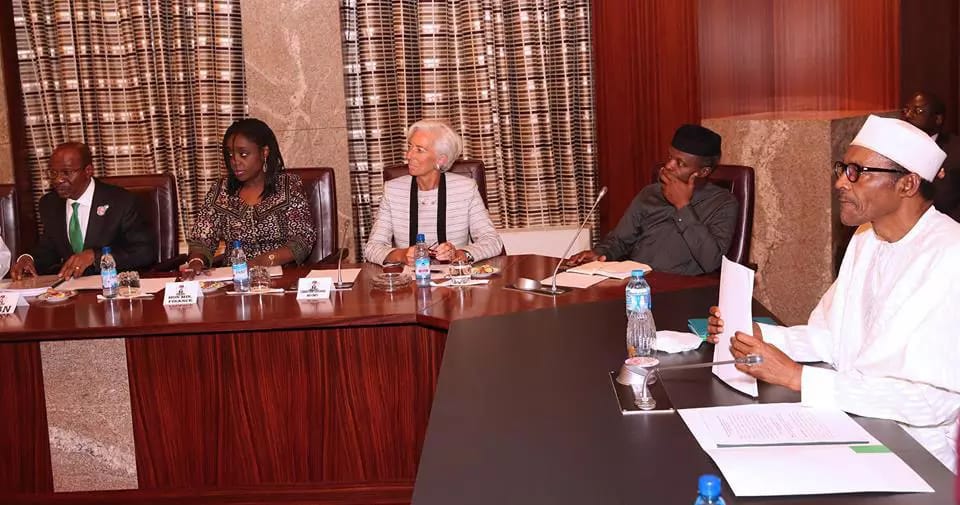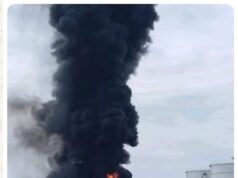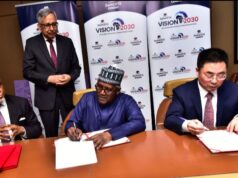 President Muhammadu Buhari has announced that henceforth all heads of Ministries, Departments and Agencies of government will fully account for all funds that get into their coffers.
President Muhammadu Buhari has announced that henceforth all heads of Ministries, Departments and Agencies of government will fully account for all funds that get into their coffers.
“We have also told all heads of Ministries, Departments and Agencies of government that on our watch, they will fully account for all funds that get into their coffers.”
President Buhari spoke today when he received in audience, the Managing Director of the International Monetary Fund (IMF), Ms. Christine Lagarde at the Presidential Villa, Abuja.
President Buhari said: “we are working very hard and with the budget as our way forward, we will do our best to ensure that our country survives the current economic downturn.”
The President said that the Federal Government is currently reviewing its operational costs and had directed all the Ministries, Departments and Agencies to cut down on their overhead costs.
He assured the IMF chief that his government would work hard to look inwards to generate revenue in addition to enforcing regulations that would stop financial leakages as well as adopting global best practices in generating more revenue to mitigate the effect of dwindling oil prices on the Nigerian economy.
He promised that his government would also enforce greater discipline, probity and accountability in all revenue generating agencies of the Federal Government.
“We have just come out of budget discussions after many weeks of taking into consideration the many needs of the country, and the down turn of the economy with falling oil prices and the negative economic forecasts.”
He said that his government will welcome the technical support and expertise of the IMF for its plans to diversify the Nigerian economy and further unleash its growth potentials.
Ms Lagarde assured President Buhari that the IMF is ready to assist his government in plugging revenue leakages, tracing stolen funds and restructuring its tax system.
She noted that Nigeria has all the potentials to overcome the current economic challenge caused by falling commodity prices without resorting to the IMF for financial support.
Ms. Lagarde later told newsmen shortly after her meeting with the President that Nigeria has become the largest economy in Africa, “certainly the most populated and with a
very attractive market.”
She said that within the last four years when she first visited Nigeria, things have changed in a more complicated way in the sense that the source of revenue to the government of Nigeria which was predominantly oil has seen its price divided by more than half and the financing cost around are beginning to rise if only because the economic situation in the United States has improved and interest rates will begin to rise.
The IMF chief said that she had excellent discussions with President Buhari, including the
challenges ahead which stemmed from oil price reduction, the necessity to apply fiscal discipline and the need to also respond to the population needs while addressing the Medium Term specificities of improving the competitiveness of Nigeria and yet also focusing on the short term fiscal situation which requires that revenue sources be identified in order to compensate the shortfall resulting from oil price decline.
She argued that oil is no longer the major contributor to the Nigerian GDP, adding: “it is only about 40 percent, but it is a big source of revenue for the government.
“We discussed with the President, Vice President and the Minister of Finance and Minister of Budget how more efficiency, more transparency, better accountability, the enlarging the base of revenue could actually contribute to sound budget going forward. It is not for me here and now to actually approve or comment on the budget because we have procedures in the IMF under which a team of Economists is going to come next week actually to do what we call the Article 4 which is to review the budget.
“We and the country’s authorities will look at whether financing is in place, whether the debt is sustainable, whether the borrowing cost is sensible and what strategy put in place in order to address challenges going forward.
“But what I certainly mentioned to Mr. President was that his fight and his determination to fight corruption and his determination to bring
about transparency and accountability at all levels of the economy are very important agenda item and very ambitious goal that needed to be deliberated upon which he, himself is definitely committed to as he indicated this morning and as he inspires his team members.
“With that I am going to have more discussions with the finance minister, with Governor of Central Bank. We will be discussing issue of fiscal discipline, financing monetary policies and the degree of flexibility, all that with the fact that Nigeria with a vibrant large economy still has to deal with poor people, a lot of inequality and those two components should certainly be the drivers of reforms, whether it is looking at subsidies and how they are structured and how they can be phased out, whether it is monetary policy and the flexibility needed and knowing what effect it has on the poor, of those are ambitions that we could quickly recognize and support. Our technical discussions will continue and to those of you who wonder why the IMF Director is visiting Nigeria. It is precisely to have good discussion about these new objectives, these reforms agendas that have been identified and supported by the President and also to appreciate the impact that it will have on neighbouring countries because when a country large as Nigeria, anything that it decides, any hardship that it faces will have consequences around it and that is what our research and analytical work is demonstrating.”
The IMF boss acknowledged that Nigeria is one of those that have impact not just on itself and its people but around it and it’s neighbours. [myad]
Home BUSINESS BANKING & FINANCE Ministries, Others To Account For Funds That Get Into Their Coffers –...






